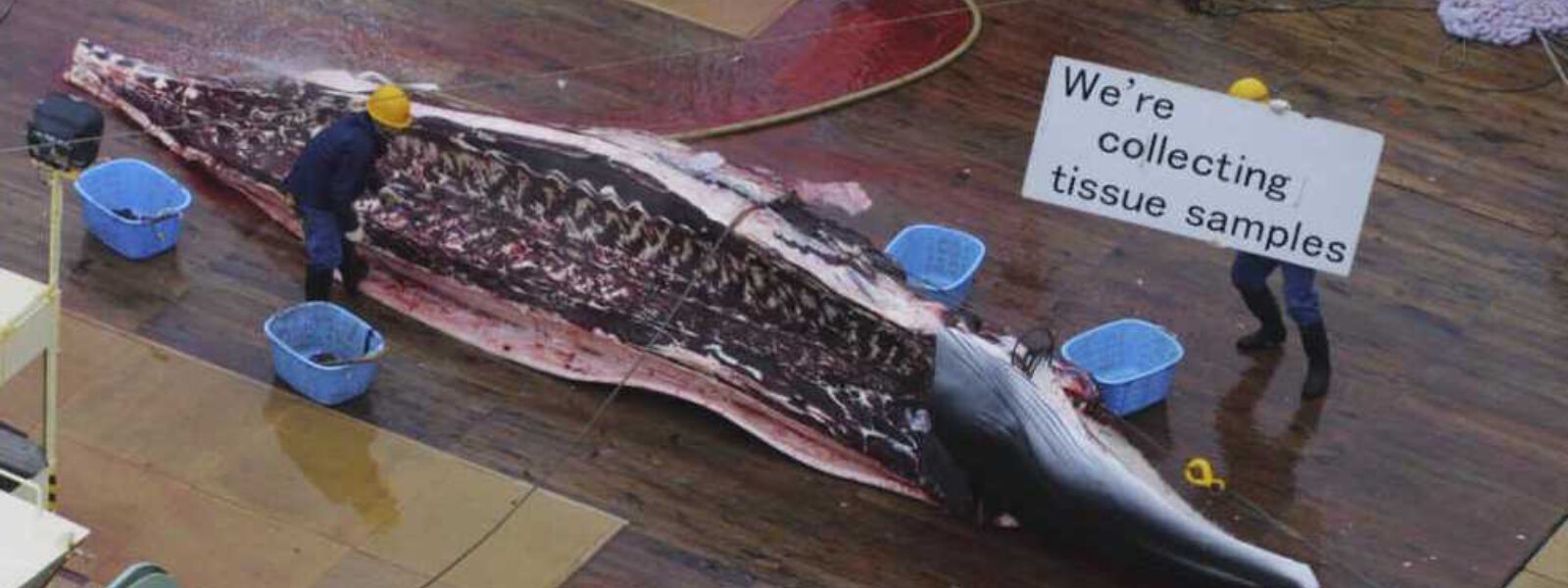

For more than 30 years the government of Japan has used the research loophole in the International Whaling Commission’s (IWC) 1985-86 worldwide commercial whaling moratorium to continue their whale slaughter. In the name of science, the Japanese Government took over whaling from commercial interests and have since killed thousands of whales with very little real scientific information to show for it.
Now, the recently passed Japanese Government Act #76 openly declares what has long been obvious to many, that the “research done on” hundreds of whales killed annually—(measuring length, weight, stomach contents, and sex—plus the sex of fetuses as many whales caught are pregnant females)—is (and has been) solely to support a full return to commercial whaling.
Ironically, the act uses the words “to implement” and “plan” as if whaling is a future goal rather than an unmitigated ongoing industry hiding behind government cover and the fig leaf of science. The Act says to include “the type and number of cetaceans targeted in the case in which cetaceans are caught” as if other methods are used when, in fact, almost all their “research” is done on whales they catch and kill.
The Act compels Japanese Government Agencies to support the whaling industry in several ways, all of which raise serious concerns.
1) Designate Whale Research Corporations and make sure such corporations can “properly and reliably capture whales”.
The lack of other specific research requirements for a corporation to acquire such status make it clear, research is not the priority. Monitoring is simply to make sure these corporations provide a steady supply of dead whales to the industry.
Blatantly missing is any research into high mercury levels and other toxins found in all whales and dolphins and the adverse effects that eating cetacean flesh has on the people of Japan, especially on children.
2) Subsidize whaling industry expenses including “dispatch of…government employees” and provision of “vessels, facilities and equipment…in order to prevent acts of interference or respond to such acts.” There is a focus on foreign interference and a mandate to “respond in the most tangible way possible”, such that businesses engaged in “processing (and) selling cetaceans…will not be caused anxiety.”
The Sea Shepherd Conservation Society—the international organization that works to police and interfere with Japanese whaling in Antarctic waters on the basis that such whaling is in violation of international law—recently announced that Japan’s use of military satellites to track Sea Shepherd’s fleets makes it no longer possible to locate Japanese whaling ships and monitor or intervene in Japan’s Southern Sea whale hunts. Yet the new Act steps up Japan’s threats to even higher military levels against both domestic and international organizations and opponents to whaling.
The concern for businesses engaged in processing and selling cetaceans gives evidence that the disposal of cetaceans is already a large ongoing commercial enterprise. Also the use of the word cetaceans here, rather than whales, indicates the act can also apply to dolphin kills and captures such as in Taiji, Japan.
3) Promote the eating of whales in Japan, (which has declined dramatically in recent decades), positioning it as a cultural tradition with a “priority (on) the promotion of utilization (in) school lunches” for children.
Here is the meat of this act--shoring up a rapidly dying market for whale and dolphin flesh. The obvious question is—if eating cetaceans is truly intrinsic to Japanese culture, why has the government had to subsidize it to the tune of millions of yen annually? And why do they need a campaign to convince Japanese people to eat whale flesh and allow it to be force fed to their children if the people’s taste, inclination and cultural pride already made eating cetaceans desirable?
The truth is, very few Japanese people ever eat whale or dolphin flesh nor do they want to, and there is no nationwide tradition to eat cetaceans in Japan. What’s more, industrial level whaling has never been “traditional” and Japan’s massive stockpile of frozen unsold cetacean flesh continues to grow.
Finally, the act claims everything will be done in accordance with “established international treaties…laws and regulations.” This points to a number of problems. IWC moratorium regulations and enforcement are weak, even with the international scientific community repeatedly decrying the research cover for ongoing whaling.
The countries that should police whaling in Antarctic waters are not doing it, likely too intimidated and more interested in profitable trade agreements with Japan. And, perhaps, the effectiveness of groups such as Sea Shepherd have pressed Japan to push back hard against both domestic and foreign objections to a brutal industry for which there is very little public support or market demand.
Please sign our petition and consider a donation to our work.
Source: Greenpeace photographer Jeremy Sutton-Hibbert, 2001